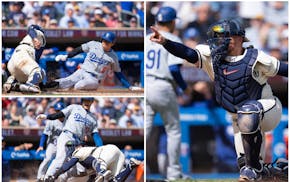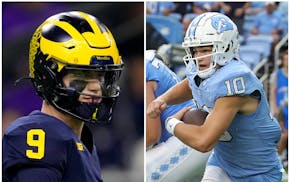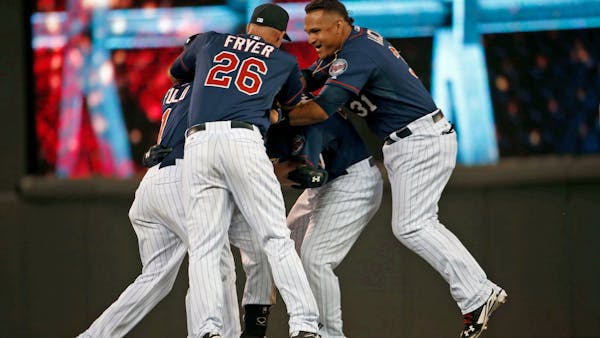The Twins played their 72nd game Friday — 44 percent of the schedule — and if you check the standings, their position looks remarkably similar to last season, a dreadful notion for sure.
The Twins entered this weekend with a 33-38 record and in last place in the American League Central, 5½ games behind red-hot Kansas City.
At this same juncture last season, the Twins were 33-38 and fourth in the division, trailing by seven games.
Mathematically, this doesn't constitute progress, but unlike 2013, this Twins season hasn't driven us to start crossing off days on the calendar until the Vikings report to Mankato. Or wonder how long that fresh coat of paint in the living room might take to dry.
The Twins give themselves a fighting chance on most days because the starting rotation no longer resembles amateur hour. Players don't look defeated before they even take the field.
The Twins also proved again Friday night that they're capable of making things interesting, even if unintentionally. All-Star closer Glen Perkins detonated a two-run cushion in the ninth by giving up four consecutive hits to the Chicago White Sox.
Brian Dozier saved a gorgeous night at Target Field from turning toxic with a walk-off single in the bottom of the ninth to give the Twins a 5-4 victory.
"We thought we had a safe one there," manager Ron Gardenhire said.
The Twins remain a flawed team, but they provide some entertainment value. Maybe that's damning them with faint praise, but after being subjected to the dregs of 90-loss futility, a season that hovers around .500 and offers some intrigue and competency makes for an enjoyable summer of baseball.
It also provides a reprieve from all the pining for Byron Buxton and Miguel Sano, otherwise known as the Great Waiting Game.
"I know we're a lot better," Dozier said. "It's night and day. To be honest, whatever our record is, whether it was worse than last year, I know we're a lot better team."
The Twins still could unravel in another late-summer slow burn, but their vulnerability is mitigated by a more representative starting rotation and a lineup that, despite its recent struggles, doesn't cause snickering.
The AL Central remains a muddled mess of mediocrity so maybe the Twins can stay relevant. They've done nothing to suggest they're ready to contend, but it'll be surprising if this team once again transforms into a bunch of zombies going through the motions. This team has some life to it.
"Honestly, I think it feels different because we're in every game," reliever Brian Duensing said.
Why? Pitching. Twins starters have posted a 2.50 ERA in the past 10 games. They're no longer a liability that saps the team of enthusiasm.
Flash back to this same week last year, and the Twins rolled out this sad trombone rotation: Kevin Correia, Scott Diamond, Sam Deduno, P.J. Walters and Pedro Hernandez. #facepalm
The Twins didn't have a starter that gave the team a clear advantage. That's an impossible way to build a winner. "People can always say that you start with a strong lineup or defense or whatever," Dozier said, "but it all starts with starting pitching. We have that this year."
Well, more competent starters, at least. The offseason acquisition of Phil Hughes has worked out better than probably anyone anticipated, and Kyle Gibson is starting to fulfill his promise as a top prospect.
Now, it's time for Ricky Nolasco to find his groove. Signed at $12 million annually, Nolasco has struggled with consistency and put his team in a hole Friday by surrendering two towering solo home runs in the first inning.
Nolasco didn't allow another run, but he was pulled with one out in the sixth, his outing finished after 104 pitches. Nolasco described his stuff as "terrible" and considered himself lucky to give up only two runs.
It's all relative, of course. We've seen worse from Twins starters. Much worse, which is why this season feels different so far, even if the record indicates something else.
"Literally, it seems like every time we come to the ballpark, every time we take the field, we have a legitimate chance to win," Duensing said. "That's what [the difference] is."
chip.scoggins@startribune.com

Scoggins: Finch feeling heat of the Suns as playoff battle looms
Scoggins: Why 'championship or bust' fits these Wolves

Scoggins: Anatomy of a game-saving play as Correa throws out Ohtani


